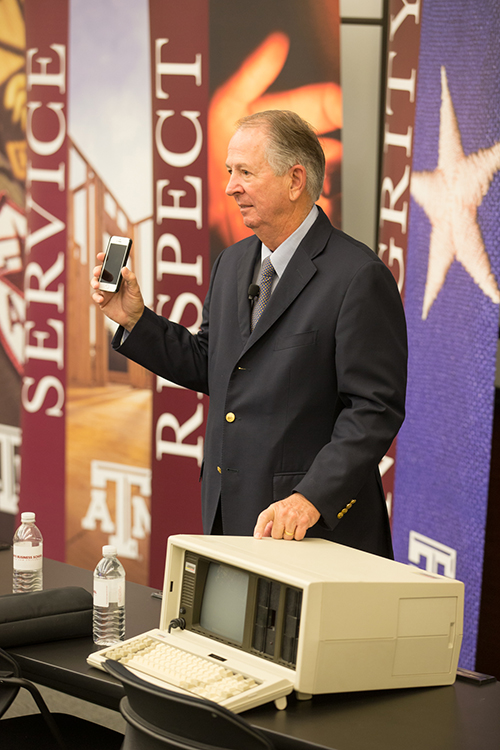Culture, Crisis, and Clarity of Vision: Three Keys to Compaq Computer Corporation’s Success
November 27, 2013
|
Mays Business School
“Nothing gives you clarity of vision and sense of purpose like the prospect of being hanged,” Rod Canion told a group of Full-time MBA students at the Mays Business School on Nov. 19. Canion, co-founder of Compaq Computer Corporation and the company’s CEO from 1982 to 1991, shared memories from Compaq’s rocket-ride to the top of the global laptop industry as well as his leadership insights on a range of issues.
After growing sales of Compaq luggable computers from 200 in January 1983 to more than 10,000 in December that year, Canion and his colleagues found themselves faced with a major crisis in early 1984. In the wake of IBM’s release of a portable PC product, the demand for Compaq’s computers had ground to a veritable halt. The dire situation presented Canion with one of the toughest decisions of his career.
“We could either stop the assembly lines, or have faith in our brand and our product and keep going forward,” he recalled. “We made the decision to continue producing computers even though we had no customers to ship them to and had to put them in semi-truck trailers around Houston. The last count I remember was that we had 20 trailers full of computers.”
As fate would have it, Compaq’s first-quarter laptop sales in 1984 rallied to beat the preceding fourth quarter, and by 1985 the company was outselling IBM 10 to 1. But that early crisis served as a test of Canion’s and his colleagues’ decision-making, not to mention their intestinal fortitude.
“Businesses make thousands of decisions every day, but a few decisions come along every so often that spell the difference between success and failure,” Canion said. “First and foremost, you’ve got to understand what the problem is. Then you have to get the right group of people together who can address the problem. If you’ve created the right culture and have the right processes in place, that group of people will be able to come up with the best course of action.”
Compaq’s culture was one of the keys to the company’s success, according to Canion. “We believed strongly in respecting each individual,” he noted, “and constantly let our employees know how important they were to our overall success. We also created an environment where it was okay to make a mistake as long as you admitted your mistake and took ownership for getting it fixed.” Canion also stated that a company’s culture depends heavily upon its top leader, and that the leadership team must consciously nurture and protect their culture by continuously talking to their employees about it.
When asked about the key attributes of successful business leaders, Canion noted three: the ability to think like an entrepreneur and take responsibility for your own actions; a positive, optimistic attitude; and the willingness to be open to new ideas as well as feedback from others.
Canion also shared his insights about how to keep a company on top and focused on its vision in an industry characterized by relentless change. “You have to constantly re-evaluate what’s going on in the marketplace around you. That means focusing on your competitors almost as much as your customers.”
In his new book titled Open: How Compaq Ended IBM’s PC Domination and Helped Invent Modern Computing, Canion offers a thorough account of Compaq’s meteoric rise, the leadership lessons he learned along the way and the critical role that the PC industry’s open-standard decision played in shaping today’s world.
About Mays Business School
Texas A&M University’s Mays Business School educates more than 5,000 undergraduate, master’s and doctoral students in accounting, finance, management, management information systems, marketing and supply chain management. Mays consistently ranks among the top public business schools in the country for its undergraduate and MBA programs, and for faculty research. The mission of Mays Business School is creating knowledge and developing ethical leaders for a global society.



